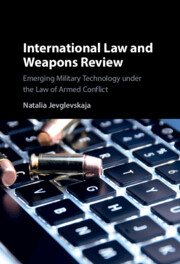Book contents
- International Law and Weapons Review
- International Law and Weapons Review
- Copyright page
- Dedication
- Contents
- Foreword
- Acknowledgements
- Table of Cases
- Table of Treaties and Other Selected Instruments
- Abbreviations
- 1 Introduction
- 2 Article 36: Background and Historical Development
- 3 Interpretative Methodology
- 4 Interpreting Article 36: The Object of Review
- 5 Interpretation of Article 36: The Process and Standard of Review
- 6 Weapons Review Obligation under Customary International Law
- 7 Weapons Reviews under the System of AP I
- 8 Challenges to Article 36 Reviews Posed by Autonomous Weapons Systems (AWS)
- 9 Challenges to Article 36 Reviews Posed by (Autonomous) Cyber Capabilities
- 10 Concluding Remarks
- Index
5 - Interpretation of Article 36: The Process and Standard of Review
Published online by Cambridge University Press: 16 December 2021
- International Law and Weapons Review
- International Law and Weapons Review
- Copyright page
- Dedication
- Contents
- Foreword
- Acknowledgements
- Table of Cases
- Table of Treaties and Other Selected Instruments
- Abbreviations
- 1 Introduction
- 2 Article 36: Background and Historical Development
- 3 Interpretative Methodology
- 4 Interpreting Article 36: The Object of Review
- 5 Interpretation of Article 36: The Process and Standard of Review
- 6 Weapons Review Obligation under Customary International Law
- 7 Weapons Reviews under the System of AP I
- 8 Challenges to Article 36 Reviews Posed by Autonomous Weapons Systems (AWS)
- 9 Challenges to Article 36 Reviews Posed by (Autonomous) Cyber Capabilities
- 10 Concluding Remarks
- Index
Summary
Relying on the methodology explained in Chapter 3, Chapter 5 clarifies the duty bearer of the weapons review obligation — ‘a High Contracting Party’ — and considers the process and standard of review covered by the terms ‘study, development, acquisition or adoption’, ‘to determine’, ‘in some or all circumstances’ and ‘this Protocol or … any other rule of international law’. It concludes that the Article 36 obligation rests on each State Party to Additional Protocol I and allows for variations in terms of form and procedure. While the establishment of a standing or permanent mechanism is not required as a matter of law, States regularly developing or purchasing weapons must adopt a certain internal approach or coherent national measures to examine the legality of new weapons. The legal standard of review indisputably comprises treaty and customary law of armed conflict. However, the proposition advanced in the legal literature to extend the review scope to human rights is unlikely to enhance protection already offered under the law of armed conflict and thus justify the inclusion of such rights in the Article 36 analysis. [181 words]
Keywords
- Type
- Chapter
- Information
- International Law and Weapons ReviewEmerging Military Technology under the Law of Armed Conflict, pp. 122 - 162Publisher: Cambridge University PressPrint publication year: 2021



